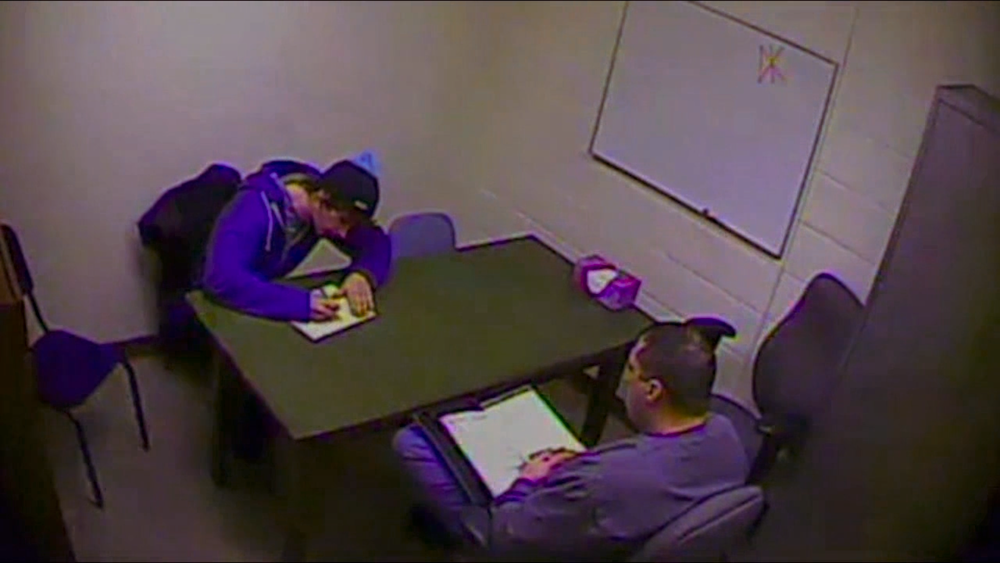Drug Task Force Encouraged College Student to Go Deeper into Drug Trade, Then He Turned Up Dead
New video shows police dangling "quick cash" as further incentive to avoid 40 years in prison for selling 3.3 grams of pot.
On his 20th birthday, Andrew Sadek sat down with a drug task force agent and

agreed to become a confidential informant to "clear up" the felony charges against him for selling a small amount of marijuana on his college's campus. About seven months later, his body was found in the Red River bordering North Dakota and Minnesota, shot in the head and wearing a backpack filled with rocks.
As I reported for Reason TV, the authorities have publicly stated they do not suspect foul play and tried to convince Sadek's parents that their son had committed suicide, even though he had never previously shown depressive tendencies. Law enforcement also refused to consider that threatening a 20 year-old with 40 years in prison over selling 3.3 grams of marijuana may have placed him in a dangerous situation he was unprepared to handle.
In a video released last week via an open records request by Inforum, Sadek, unaccompanied by a lawyer or his parents, had his fateful meeting with Deputy Sheriff Jason Weber of the Southeast Multi-County Agency (SEMCA) drug task force and "voluntarily" agrees to become an informant.
The conversation is always polite, but Weber frequently reminds Sadek that he faces felony charges unless he helps SEMCA nail a few drug dealers. Weber also uses the "carrot and stick" approach, telling Sadek that by helping the police bust drug dealers in one of the safest towns in the state, he also had the opportunity to make "quick, easy cash," with the incentives increasing in conjunction with the increased risk.
Archie Ingersoll at Inforum writes:
Weber then began probing Sadek for information, asking if he knew people at the college or around town who could sell him marijuana. At one point, the detective specifically asked if there were any football players on campus from which he could buy drugs.
Sadek told Weber he knew of two dealers, but neither played football. One dealer lived in Wahpeton, and the other was in Fargo, he said.
Showing eagerness, Weber asked Sadek if he thought he could arrange to buy pot from the Wahpeton dealer that same day. "I could try," Sadek responded.
Weber told Sadek that once he'd made enough drug buys to remove the possibility of felony charges, he could work as a paid informant and earn "quick, easy cash."
"You go buy some marijuana, it takes you five minutes, you'll get paid 100 bucks to do a deal. If you go buy meth, pills, whatever, you get paid 200 bucks," Weber said.
Not spending 40 years in prison, forever branded a convicted felon… and 200 bucks? What a deal!
How Andrew Sadek wound up shot and in a condition more plausibly ascribed to a murdered and disposed-of body than to a young person's suicide remains a mystery, but this video leaves no question that Weber, representing SEMCA, encouraged Sadek to engage purveyors of "meth, pills, whatever," a more hardened and dangerous class of drug dealer than your average college pot smoker would be accustomed to. Moreover, Weber encouraged Sadek to make new "contacts," essentially telling him to seek out drug dealers he didn't yet know.
When Sadek expressed concern that the drug dealers he informed on would learn he was a "rat," Weber downplayed the risk:
During the meeting, Weber did not specifically make Sadek aware of the potential dangers involved with being an informant. However, Weber did have Sadek, like other task force informants, sign a contract acknowledging he understood the rules of informant work. One of those rules is that informants may have to testify in court and, in the process, blow their cover.
To ease any concerns Sadek had about this possibility, Weber told him, "I've been doing this a long time. My partners have been doing this a long time. We have never, ever had anybody come back to testify, yet."
Looking for more reassurance, Sadek asked, "They're not going to know that I ratted them out?"
In response, Weber explained that after undercover deals, the task force waits a few months and lets the dealer sell to other people before making an arrest. By that time, the dealer won't know for sure which buyer was wearing a wire, Weber said.
Because Sadek knew of just two drug dealers, Weber told him to start looking for more "contacts," or dealers. "Start working on your contacts. Let's get some of these deals done. That way the faster you get done, the faster …"
When Sadek turned up dead, the very law enforcement agencies who sent him far deeper into the drug trade than he had ever been before declined to vigorously investigate his death. A report issued by the North Dakota Attorney General "did not have any concerns with the case files where Sadek was a CI and conducted controlled buys."
For more background on the case and the trend of colleges and law enforcement colluding to make confidential informants out of non-violent, first-time offending college students, watch the video below:


Show Comments (44)